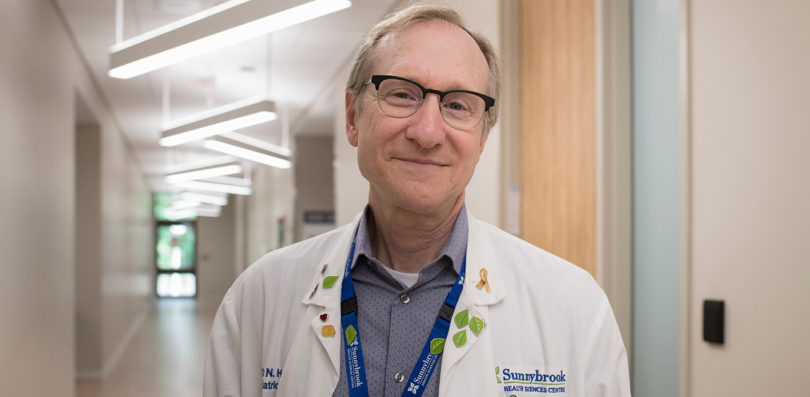(Photography by Kevin Van Passen)
Geriatric psychiatrist Dr. Nathan Herrmann has dedicated his career to treating and researching Alzheimer’s disease and dementia
When Dr. Nathan Herrmann was a medical student, he intended to specialize in orthopaedic surgery.
Instead, he became the “Memory Doctor,” specializing in geriatric psychiatry and dementia.
While geriatric psychiatry is not a popular specialty for physicians, Dr. Herrmann explains this area of medicine fits his interests perfectly.
I have an affinity for older people,” he says. “I grew up with my grandmother living in our home and had a very close relationship with her. I appreciate the wisdom of the elderly and I’m fascinated by the amazing stories they tell about their lives and experiences.”
About 25,000 Canadians are diagnosed with dementia every year and more than 600,000 Canadians are living with the disease.
“The risk for Alzheimer’s and other dementias increases significantly after age 65,” notes Dr. Herrmann, “and people are living longer.”
With what Dr. Herrmann refers to as “the silver tsunami” upon us, his expertise and insights are more valuable than ever.
Dr. Herrmann also consults on a regular basis at Sunnybrook’s Veterans Centre and the Dorothy Macham Home, a facility that supports veterans with challenging dementia-related behaviour. The average age of the 475 resident veterans is 95.
“I work with the staff at the Veterans Centre on diagnostic issues and the treatment and management of neuropsychiatric symptoms,” he explains, “and on a weekly basis with staff at the Dorothy Macham Home, where residents’ dementia is more advanced and the symptoms are more severe.”
“We have a complex team,” notes Dr. David Shergold, an attending physician at the Veterans Centre and at the Dorothy Macham Home. “And we wouldn’t be as effective without Dr. Herrmann’s leadership and his expertise in looking at some of the dementia behaviours as expressions of war-related stresses.”
According to Dr. Herrmann, visual and auditory reminders of the war, for example, can exacerbate symptoms of post-traumatic stress disorder. “Veterans may become anxious, agitated [or] depressed and [may] experience sleep disorders or withdraw,” he explains.
Dr. Shergold adds, “We all benefit as staff members from Dr. Herrmann’s wisdom. The veterans benefit even more.”
They also benefit from Dr. Herrmann’s research, which focuses on drugs to control dementia symptoms. He has co-authored dozens of papers based on results of clinical trials at Sunnybrook.
This summer, at the Alzheimer’s Association International Conference in Chicago, he presented evidence that nabilone, a synthetic cannabinoid, “demonstrated a significant reduction in agitation and aggression…and a significantly greater reduction of overall behavioural problems.”
The risk for Alzheimer’s and other dementias increases significantly after age 65, and people are living longer.
Dr. Nathan Herrmann,
geriatric psychiatrist
Dr. Herrmann also consults with physicians in the community and is well known online as the Memory Doctor. His blog answers questions about dementia and offers advice about brain health.
“The issues I deal with are questions that come up with every single patient and family,” he says. “I saw a need to educate the community about issues related to dementia. There are things people can do to reduce the risk of cognitive decline.”
His recommendations include exercise, a Mediterranean diet, stimulating activities and good medical care for things like high blood pressure.
The 60-year old psychiatrist practises what he preaches. He eats very little red meat and plenty of fruits and vegetables, and he goes to the gym three times a week. On other days, he cycles or walks through the paths and gardens surrounding Sunnybrook.
And while he may do his daily walk at a comfortable pace, his mind is often racing. “Sometimes, as I’m walking, I’m thinking about patients or writing papers in my mind,” he says.
“It’s very important to keep mentally active. For some people, that means working. Work gives structure, schedule, social interaction and mental stimulation. But there are lots of ways to keep mentally active. The research does not provide great clarity on the best way to do mental stimulation, but we recommend doing as many mentally stimulating activities as possible.”
Dr. Herrmann finds the enigma of dementia – the fuzziness surrounding the diagnosis, cause and treatment of the disease – both stimulating and challenging.
“There is so much work to do, so much research needed to understand the basic components and the causes and how to treat it. It’s a gratifying area to be in.”
But he concedes that finding a cure for dementia has been slow going. “When I started my career in the late 1980s, I’d tell audiences that I was confident there’d be a cure in 10 years. I stopped saying that 10 years ago.”
Nevertheless, Dr. Herrmann maintains a positive perspective. “There is a lot we can do to improve the lives of people with dementia by treating symptoms and treating aspects of the disease that need to be addressed to help families deal with it.”








